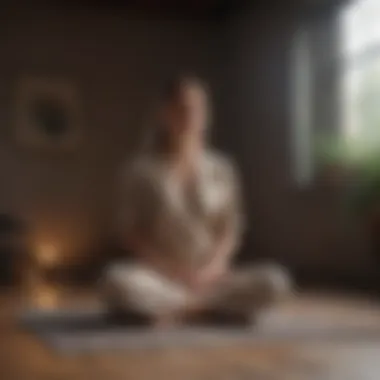Navigating Social Anxiety Through Meditation Techniques


Intro
Social anxiety is a prevalent issue that affects many individuals across various age groups and backgrounds. The fear of judgment in social situations can be debilitating. Consequently, it restricts personal and professional growth and even causes emotional distress. Many individuals seek various methods to manage and alleviate these feelings. One of the most compelling tools in this realm is meditation.
Meditation offers a structured platform to cultivate mindfulness, allowing individuals to observe their thoughts and feelings without judgment. This practice enables a deeper understanding and acceptance of one's anxiety, rather than merely attempting to avoid it. As we explore the intersection of social anxiety and meditation, it is crucial to identify the benefits and the specific meditation techniques that may be most effective in addressing this challenge.
Benefits of Guided Meditation
Guided meditation has been recognized for its benefits in managing anxiety and fostering emotional well-being. It serves as a practical approach for those grappling with social anxiety, providing a means to ease their fears through focused practice.
Enhancing Mindfulness
Mindfulness is a state of awareness that encourages individuals to remain present in the moment. This aids in recognizing anxious thoughts as fleeting and temporary. Through guided meditation, individuals learn to center their attention on their breath, sensations, or even a facilitator's voice, promoting a sense of grounding. Research has shown that those practicing mindfulness might experience a reduction in rumination patterns, which often exacerbate anxiety.
Reducing Anxiety
Evidence suggests that regular engagement in guided meditation can lead to decreased feelings of anxiety. One study by the American Psychological Association indicated that mindfulness practices significantly lowered anxiety levels among participants. By systematically calming the mind, guided meditation can help individuals replace fear-inducing thoughts with more constructive perceptions.
"Meditation is not about stopping thoughts, but recognizing that they are thoughts and allowing them to pass."
— Jon Kabat-Zinn
Types of Guided Meditations
There are various forms of guided meditation that can be beneficial for individuals with social anxiety. Selecting the right type can facilitate a better experience and enhance the therapeutic effects. Examples include:
Morning Meditations
Starting the day with meditation can set a positive tone. Morning guided meditations may focus on intention setting and fostering a sense of confidence. Engaging in such practices before social interactions can prepare the mind to enter the day with a proactive approach rather than a reactive one.
Evening Relaxation
Evening guided meditations often aim to help individuals unwind and reflect on the day. These sessions may lead to reduced somatic symptoms of anxiety such as racing thoughts or tension. By incorporating relaxation techniques into the evening routine, individuals can cultivate a conducive environment for restful sleep and emotional equilibrium.
Fostering an understanding of how to utilize guided meditation effectively can be transformative. It is important for everyone, especially those facing social anxiety, to explore these techniques to uncover what resonates best with their own needs. By integrating meditation into daily life, individuals can not only manage anxiety but also enhance their overall emotional resilience.
Understanding Social Anxiety
Social anxiety is a prevalent issue that affects many individuals across different backgrounds and ages. Understanding this condition is crucial, especially when exploring its connection to meditation. For those who experience it, social anxiety can create barriers to engaging with others and enjoying normal life. Grasping the nuances of social anxiety enables both the individual and practitioners to identify effective coping mechanisms.
Defining Social Anxiety
Social anxiety, often described as the intense fear of social situations, manifests as a concern about being judged or criticized by others. This condition can range from mild discomfort to debilitating fear. The Diagnostic and Statistical Manual of Mental Disorders (DSM-5) classifies social anxiety disorder as a distinct condition, distinguishing it from general shyness or introversion. Such a clear definition helps direct attention toward appropriate strategies for management.
Symptoms and Manifestations
Symptoms of social anxiety can be diverse and can vary from person to person. Common signs include:
- Excessive sweating in social situations
- Rapid heartbeat or palpitations
- Difficulty speaking or making eye contact
- Fear of public speaking or participating in group activities


These symptoms can significantly impact daily functioning and lead to avoidance behaviors, resulting in isolation. Understanding these symptoms is essential for anyone facing social anxiety since recognizing them can be the first step toward seeking help or implementing coping strategies.
Root Causes of Social Anxiety
The root causes of social anxiety are multifaceted. They potentially include:
- Genetics: Family history may play a crucial role in determining the likelihood of developing social anxiety. Studies indicate a hereditary component in many cases.
- Environmental factors: Traumatic social experiences, such as bullying or humiliation, can significantly influence the development of social anxiety.
- Neurological factors: Brain functioning and chemical imbalances might contribute to anxiety disorders. Certain pathways associated with fear responses can be excessively activated in affected individuals.
By understanding root causes of social anxiety, there is potential for targeted interventions, particularly for those interested in incorporating meditation as a therapeutic tool.
The Science of Meditation
Understanding the science of meditation is crucial for making sense of its effects, especially when it comes to managing social anxiety. Meditation is not merely a trend. It is a practice grounded in centuries of tradition, supported by a growing body of scientific research. Through the exploration of various meditation techniques, one can uncover how these practices can bring about profound changes in mental health and overall well-being.
Overview of Meditation Techniques
There are several meditation techniques available today, each with its distinct approach and benefits. Some common forms include:
- Mindfulness Meditation: Focuses on being present and aware of sensory experiences without judgment.
- Concentration Meditation: Involves focusing intently on a single point—like breath or a mantra—to enhance concentration.
- Transcendental Meditation: A simple technique involving the silent repetition of a specific mantra, promoting relaxed awareness.
- Loving-Kindness Meditation: Emphasizes the cultivation of an attitude of love and kindness toward self and others.
Each technique allows practitioners to address specific needs, including the management of social anxiety. The flexibility to choose a method ensures that individuals can find what resonates best with them and their particular situation.
Mindfulness vs. Concentration Meditation
Mindfulness and concentration meditation often appear similar but serve different purposes.
- Mindfulness Meditation encourages an open acceptance of thoughts and emotions as they arise. Practitioners observe their feelings without attachment, fostering a deeper understanding of their mental processes. This can be beneficial for those with social anxiety, as it helps them recognize and acknowledge anxiety without being overwhelmed by it.
- Concentration Meditation pushes for a more focused approach. By honing attention on a single focal point, this technique helps improve concentration and mental stamina. Individuals struggling with scattered thoughts can find this type of meditation particularly useful, allowing them to create mental clarity amidst anxiety.
Neuroscience Behind Meditation
Recent neuroscientific studies reveal that meditation induces measurable changes in the brain. Research indicates that regular meditation practice can lead to:
- An increase in gray matter density in areas associated with emotional regulation and self-referential thought.
- A decrease in the activity of the amygdala, the part of the brain responsible for fear response.
- Enhanced connectivity within different brain regions, promoting emotional stability.
These changes support the assertion that meditation effectively reduces anxiety. Studies have shown that meditation not only alters brain structure but also impacts overall mental health.
The mental and emotional benefits are not immediate but develop over time as consistent practice leads to changes in brain function and structure.
Embracing meditation as a scientifically validated approach opens new avenues for those grappling with social anxiety, providing both immediate relief and long-term improvement in mental health.
Meditation as a Tool for Social Anxiety
Meditation has emerged as a valuable tool for alleviating symptoms of social anxiety. This practice can empower individuals to regain control over their thoughts and feelings. The importance of meditation lies in its ability to provide a calming refuge during moments of overwhelming anxiety. Specifically, meditation fosters self-awareness, reduces stress, and enhances emotional regulation. By building a consistent meditation practice, individuals can gradually reshape their responses to social situations.
Furthermore, meditation encourages individuals to focus on the present moment. This focus can significantly reduce the tendency to ruminate on negative past experiences or fear potential future judgments. In this context, meditation does more than just offer temporary relief; it lays the groundwork for long-term resilience against anxiety triggers.
How Meditation Alleviates Symptoms


Meditation alleviates anxiety symptoms by promoting relaxation and mindfulness. Practicing meditation helps in decreasing the overall level of stress hormones in the body. This reduction directly translates to a lesser degree of anxiety. Moreover, participating in meditation actively shifts one's focus away from anxious thoughts. It creates an internal environment that is conducive to peace and calmness. Regular practice results in a marked increase in emotional stability.
Specific Techniques for Targeting Anxiety
-#### Guided Visualization Guided visualization involves imagining a scene or situation that brings comfort and a sense of safety. This technique is unique because it directs the mind away from distressing thoughts. People find guided visualization beneficial due to its ability to encourage relaxation. It is popular among individuals with social anxiety as it fosters a positive mental state before facing social situations. The disadvantage might be the reliance on guidance, which may not be accessible at all times.
-#### Breathing Exercises Breathing exercises are fundamental in managing anxiety. They focus on regulating breath, which can shift the body's response to stress. The key characteristic is their simplicity and accessibility; they can be performed anywhere at any time. This makes breathing exercises a powerful choice for those seeking relief from anxiety quickly. One disadvantage is that it can take practice to develop the discipline required to use breathing effectively in a moment of anxiety.
-#### Mindful Movement Mindful movement, such as yoga or tai chi, encourages mindfulness through physical activity. This combination helps in releasing pent-up emotions and stress. The unique feature of mindful movement is its dual approach—both meditation and movement. It is beneficial as it allows one to connect body and mind. However, some individuals might find it challenging to engage in physical activity, especially during high states of anxiety.
Success Stories and Case Studies
Case studies have shown notable success in using meditation to combat social anxiety. Many individuals report feeling more grounded in social interactions after integrating meditation into their daily routine. Several mental health professionals have documented improved outcomes in clients who practiced various forms of meditation. These real-life applications highlight that while meditation may not be a cure-all, it can serve as a significant component of a broader strategy for managing social anxiety.
Through meditation, individuals can cultivate a sense of empowerment, allowing them to approach social situations with improved confidence.
Integrating Meditation into Life
Integrating meditation into daily life is an essential step for those seeking to manage social anxiety effectively. This act not only fosters a consistent practice but also enhances the benefits that meditation offers. Often, beginners may underestimate how crucial routine is in cultivating mindfulness. A personal meditation routine can serve as a foundation, promoting stability and emotional resilience. As users incorporate meditation consistently, they may start to notice changes in their anxiety levels.
Creating a Personal Meditation Routine
To start, it is valuable to establish a meditation routine that fits easily into one's lifestyle. Identify a specific time and place where meditation can occur regularly. Some may find early morning meditation more beneficial, offering a peaceful start to the day. Others might prefer evening sessions to unwind.
- Set Duration: Begin with short sessions, perhaps five to ten minutes. Gradually increase this time as comfort with the practice builds.
- Choose a Space: Find a quiet area free from distractions. This may be a bedroom, office, or even a park.
- Be Consistent: Try to meditate at the same time daily. This consistency is critical for forming a new habit.
Keeping a journal to reflect on experiences during meditation can help provide insights over time. Readers may realize patterns in their thoughts or emotions, facilitating a deeper understanding of their social anxiety.
Tools and Resources for Practicing
Various tools and resources can enhance the meditation experience. Here are some suggestions:
- Apps: Consider using apps such as Headspace or Calm. They provide guided meditations catering to different needs, including those focused on reducing anxiety.
- Books: Literature about meditation practices can deepen understanding. Books like "The Miracle of Mindfulness" by Thich Nhat Hanh offer valuable perspectives.
- Online Communities: Platforms like Reddit have communities focused on mindfulness and meditation, where individuals can share insights and experiences.
Utilizing these resources can make meditation more engaging and informative. Users may discover additional techniques and find community support, which can be motivating and beneficial.
Overcoming Obstacles in Practice
Many individuals encounter challenges when beginning their meditation journey. Recognizing these obstacles is crucial to maintaining a practice. Common barriers include:
- Restlessness: It is normal to feel restless or distracted. Focus on the breath can help bring attention back, easing discomfort.
- Self-Doubt: Some may question the effectiveness of meditation. Understanding that progress takes time is important. Regular practice usually yields gradual improvements.
- Time Constraints: Many people lead busy lives. Even short sessions can create a significant impact. Finding even five minutes during a day can serve as a meditation practice.
It is also beneficial to shift the mindset around meditation. Approach it as a journey rather than a destination. Experimenting with different techniques can help find what resonates most, making the process more enjoyable and sustainable.
By integrating meditation into daily life with discipline and awareness, individuals can find a path to manage their social anxiety effectively and foster greater mental well-being.
Implementing these strategies can ease the transition into a meditation practice, making it a more integrated and natural part of life.


Expert Insights and Research
Understanding the interplay between social anxiety and meditation necessitates an exploration of both expert insights and current research. Mental health professionals play a crucial role in not only identifying the mechanisms behind social anxiety but also guiding individuals towards effective management strategies. Insights from these experts lend credibility to the claims made about meditation's efficacy in reducing anxiety symptoms. Furthermore, scientific studies provide empirical evidence that supports the theoretical frameworks regarding meditation practices and their benefits on mental health. This section will examine these insights from professionals in the field, review relevant studies, and offer a glimpse into future research directions that could advance our understanding of these topics.
Interviews with Mental Health Professionals
Experts in psychology and psychotherapy can offer invaluable perspectives on the use of meditation as an adjunct to traditional treatment methods for social anxiety. Interviews often reveal how practitioners incorporate mindfulness and meditation techniques into their therapeutic approaches. Many professionals note that meditation helps clients in several ways:
- Self-awareness: Clients often become more attuned to their thoughts and feelings, enabling them to identify triggers for their anxiety.
- Coping strategies: Meditation provides tools to manage stress, teaching individuals how to respond calmly in triggering social situations.
- Reduction in avoidance behavior: Regular practice can lead to increased confidence and a decrease in behaviors primarily driven by fear of social judgment.
The narratives from these interviews illustrate not just the benefits of meditation but also how it can be tailored to meet individual needs. For instance, some therapists recommend guided visualizations while others prefer breath-focused techniques, demonstrating the flexibility and adaptability of meditation practices.
Review of Relevant Studies
Recent studies highlight the positive outcomes associated with meditation for individuals dealing with social anxiety. Research primarily focuses on how meditation influences the brain and its response to anxious thoughts and feelings. A notable study published in the journal "Psychological Science" suggests that mindfulness meditation contributes to a decrease in physiological symptoms of anxiety. Participants engaging in mindfulness practices showed reduced heart rates and lower cortisol levels in stressful social situations.
Additionally, a meta-analysis conducted by researchers at the University of Pennsylvania compiled data from various studies, confirming that meditation significantly alleviates anxiety symptoms. Key findings from this analysis include:
- A reduction in negative emotional responses during social interactions.
- Improved emotional regulation after consistent meditation practice.
- Enhanced resilience to social stressors through mindfulness training.
Such findings validate the claims made by mental health professionals and underscore the need for further exploration into meditation as a viable treatment option for social anxiety.
Future Directions in Meditation Research
As the understanding of social anxiety and meditation evolves, future research is poised to investigate several key areas:
- Longitudinal studies: Examining the long-term impacts of meditation on social anxiety will help understand the sustainability of its benefits.
- Neuroimaging studies: Utilizing advanced brain imaging techniques could elucidate the neurological changes that occur with regular meditation in anxious individuals.
- Diverse populations: More research is needed to explore how different demographics respond to meditation, allowing tailored interventions that consider cultural contexts.
Research in these areas may lead to innovative strategies that integrate meditation more effectively into therapeutic practices. Overall, expert thoughts combined with ongoing research will continue to shape our understanding of the complexities in managing social anxiety through meditation.
The End and Future Implications
In closing, this exploration into the intersection of social anxiety and meditation reveals significant understanding of how these two realms connect. Social anxiety can deeply affect a person’s daily life, causing distress and isolation. Acknowledging this reality is the first step toward healing. The role of meditation in managing these symptoms is increasingly recognized.
Meditation offers various practical techniques that can alleviate the symptoms of social anxiety. Importantly, mindfulness and breathing exercises have emerged as particularly effective methods. They provide tools for individuals to ground themselves in moments of distress, allowing them to respond with clarity instead of reactively. By fostering a sense of presence and calm, meditation serves as a powerful aid in managing emotional challenges associated with social anxiety.
The implications of integrating meditation into treatment plans are vast. Research is increasingly supporting the effectiveness of mindfulness practices. Benefits extend beyond anxiety relief, enhancing overall mental health. Individuals practicing meditation may find improved emotional resilience, leading to a more fulfilling life both socially and personally.
However, it is vital to recognize that meditation is not a standalone solution. It should complement other therapeutic approaches. Mental health professionals can collaborate with individuals to create personalized plans that include meditation, counseling, and possibly medication when necessary.
Summarizing the Connection
The relationship between social anxiety and meditation is profound and multifaceted. Meditation techniques such as mindfulness have been shown to lower anxiety levels by promoting self-awareness and emotional regulation. This connection illustrates how an ancient practice has relevance in contemporary mental health discussions. Many have found a renewed sense of agency in their lives through these practices, fostering not just the reduction of anxiety, but an overall improvement in quality of life.
"Mindfulness not only transforms how we relate to anxiety but also informs how we engage with the world around us."
Moreover, the science underpinning these practices indicates measurable changes in brain activity and emotional response. The benefits are supported by a growing body of evidence, making these connections crucial for those seeking to understand effective approaches to anxiety management.
Encouragement for Continued Exploration
As we conclude, it is essential to encourage individuals to explore these avenues further. Each person's journey with social anxiety is unique; hence, the approach must be tailored. Experimenting with different meditation styles can yield personal insights. Simple practices such as guided visualization or mindful movement can lead to significant transformations over time.
Engaging with community resources or seeking expert guidance can also enhance this exploration. Reading widely about meditation techniques can inspire practitioners. Online platforms like Reddit offer discussions and community support, which can be invaluable. Always consider incorporating feedback from mental health professionals into your practice for optimal results.
In summary, the intersection of social anxiety and meditation opens doors to new coping strategies. Individuals are encouraged to embark on this path with curiosity and an open mind. Embrace the journey, as the benefits may extend far beyond what is initially anticipated.







